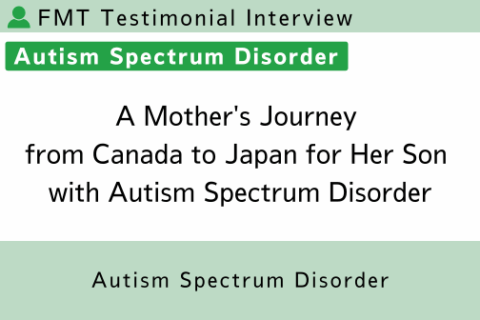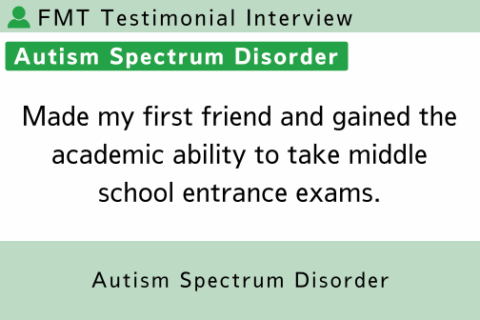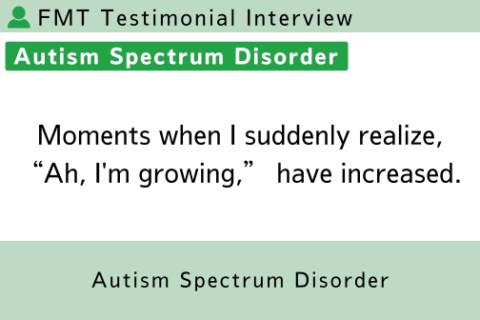We received patient feedback from families of children with autism spectrum disorder with intellectual disability.
Not only have my likes and dislikes decreased and I can eat almost anything, but I have become more mentally stable and my eyesight and mood have changed.” The students answered, “We are very happy with the results.
[Profile]
Disease name: Autism spectrum disorder with intellectual disability
Transplant period: June 14, 2021 – September 6, 2021
Number of transplants: 6
Medical institution in charge of transplantation: Tanaka Clinic, Jinseikai Medical Corporation
Affiliated medical institution: Koide Clinic
Q1. WHAT MADE YOU DECIDE TO UNDERGO INTESTINAL FLORA TRANSPLANTATION AT OUR INSTITUTE?
I don’t know the details of the gut bacteria, but the “brain-gut correlation” seems to be a fact, and I surmised that the lack of diversity may be manifested in autistic symptoms.
I decided to do it because my doctor recommended that it would be effective if done in conjunction with nutritional therapy.
Q2. Did you receive sufficient explanation and support from the medical institution from the time of your transplant application until after the transplant was completed?
Since my interactions with the study group were mainly online, I thought it would be nice to have a place where I could consult with them face to face. Especially since there are many symptoms and changes in autism that cannot be understood by written expressions alone, without seeing the person in person.
Q3. How have your symptoms changed after the transplant?
As a result of the transplantation along with nutritional therapy, his eating habits have improved considerably. His likes and dislikes have decreased and he can now eat almost anything.
HE HAS BECOME MENTALLY STABLE, HIS EYES AND MOOD HAVE CHANGED, AND HE HAS SHOWN INTEREST IN PLAYING WITH LEGO BLOCKS AND OTHER THINGS HE NEVER DID BEFORE. HE IS STILL VERY PARTICULAR, BUT HIS AWARENESS HAS BECOME CLEARER, HIS INTENTIONS CLEARER, AND HE IS MORE AWARE OF DETAILS.
No epileptic seizures (except immediately after transplantation), so far.
Q4. In order to maintain the intestinal bacteria that became your friends through transplantation, please tell us about any lifestyle habits or ways of thinking that you are trying to maintain after transplantation.
I TRY TO EAT A GOOD AMOUNT OF VEGETABLES, AS I KNOW THAT BACTERIA LOVE FIBER. HE HAS CUT BACK ON SNACK FOODS AND NOODLES, SNACKS ON NUTS, EATS RICE IN QUINTUPLES, AND TAKES PROTEIN AND B VITAMIN SUPPLEMENTS AS SUPPLEMENTAL FOODS.
Since humans are part of nature, he believes that the living environment is important, so he spends weekends with his family in a natural farm where he gets in touch with the soil. They eat a lot of organically grown vegetables from there.

Q5. What would you say to those who are going to have a transplant or are unsure about it?
Transplantation and diet therapy will not last unless you take the initiative and do it yourself, so I think it would be better if you gather information and think about it until you are satisfied with it and choose it as a way of life, rather than because someone tells you to.
Q6. Please give a message to the donor who provided the stool for the transplant.
I would like to thank you from the bottom of my heart for being the first to recognize the importance of intestinal bacteria and for taking action to promote a symbiotic relationship with healthy bacteria. I think this is a courageous act.
Q7. Please let us know any other comments, opinions, or requests you may have.
Please continue to do your research and do your best to provide more information to more people at conferences, presentations, study groups, and opportunities for patients to interact with each other.


















